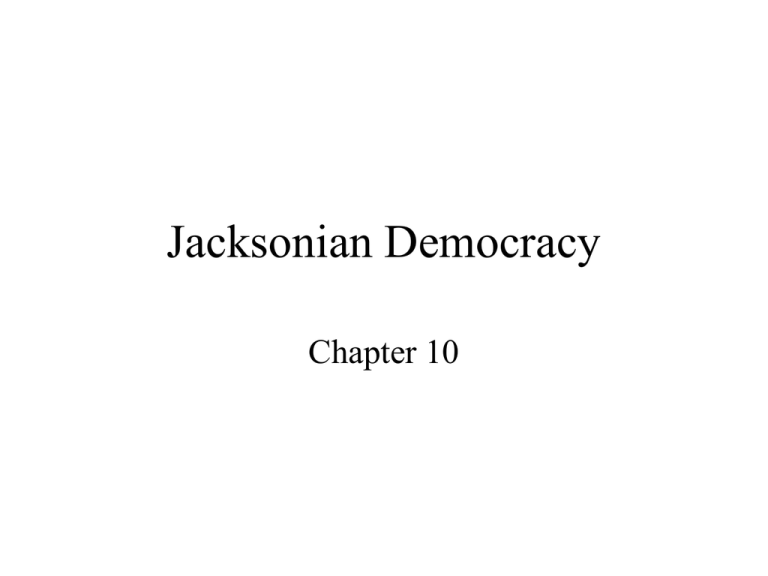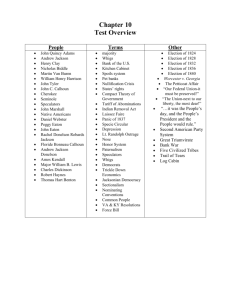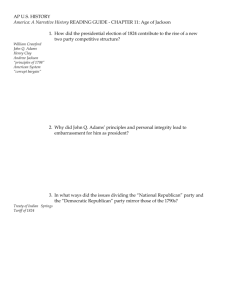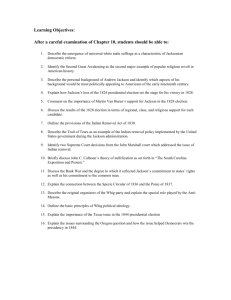Chapter 10 PPT
advertisement

Jacksonian Democracy Chapter 10 The Changing Political Landscape • Why did the “Era of Good Feelings” End? • What was the 5 point political plan to make the political process more democratic in the 1820s? • What were the effects of the controversial election of 1824? (“Corrupt Bargain” election) Election of 1824 The Age of Jackson • How did Jackson win the election of 1828, effectively a rematch between him and John Quincy Adams? (“common man”) Election of 1828 Jackson’s Ideals – A Mixed Bag • Father of the Spoils System • Opposed Internal Improvements (Maysville Road Veto) • Indian Removal Act (Worcester v. Georgia) • Pro-Tariffs (Tariff of Abominations) • “Kitchen Cabinet” Democratic Party Andrew Jackson’s “common man” ideals led to the formation of the new Democratic Party Controversies in Jackson’s Term • Nullification Crisis (Calhoun v. Jackson) and Compromise of 1833 (Clay) • The National Bank (Biddle v. Jackson) • How did the controversies affect the Election of 1832? (Clay v. Jackson) Nullification Crisis John Calhoun led the protests against the tariff and a nullification crisis followed Henry Clay encouraged the Compromise of 1833, which prevented military action by Jackson against South Carolina and lowered the tariff Second National Bank Jackson fights the bank “monster” and drags Nicholas Biddle with him in the process Election of 1832 Clay wants to implement his American System supporting industry (internal improvements, tariffs) but Jackson’s “common man” popularity wins him the election King Andrew I • In pairs, using one of the topics/ideals of Jackson (split one sheet of paper): 1) Create a political cartoon that supports the action taken by Jackson (consider who would support this) 2) Create a political cartoon that is against that ideal (consider who would be against this) Jackson’s Democracy Stumbles • What did Jackson try to accomplish and what were the results? (Pet Banks, Specie Circular) • Who were the supporters of the Whig Party? • Why did Van Buren win the Election of 1836? Election of 1836 Four Whigs attempt to split vote with Van Buren to send election to the House, but ultimately it backfires because they confuse voters Van Buren’s Presidency • What caused the Panic of 1837? • What did Van Buren do to combat the Panic? How well did it work? Panic of 1837 The Panic of 1837 shows that Specie Circular is not working The Whigs on the Rise • How did the Whigs become a competitive 2nd party during the 1830s and what were their beliefs? • What new developments allowed the Whigs to win the election of 1840? (“Log Cabin Campaign”) Election of 1840 Harrison’s “Log Cabin” Campaign gave the Whigs victory as they appealed to the “Common Man” If there was TV • For one of the campaigns do the following: 1) Create a speech for your candidate that explains their background and beliefs (3 beliefs) 2) Create a TV skit that advertises for your candidate and party (3 things) 3) Create a TV skit that attacks the other candidate(s) and party – 3 things - 1824/1828 (Adams or Jackson) - 1832 (Jackson or Clay) - 1836 (V. Buren) - 1840 (VB or Harr) Religion and Reform • For the religion or reform you have: 1) Find an important person related to it and create an “interview” with that person (3 questions about why they founded it) 2) Create an advertisement for it showing at least 3 beliefs that it has 3) As a newspaper reporter, report on where it is and why people are joining this group (3 reasons) Second Great Awakening • What were the causes of the 2nd Great Awakening? • What were the general affects of religion in the West? In the Northeast cities? Reform Movements • Why was New England the center of most reform movements? • How did this era of reform differ from Voluntary Associations that were previously created? • What affects did reform have on the relationships between the North and South? Methodist Camp Meeting Peter Cartwright used religious camp meetings to promote a respectable Christian society in the West Revivalists Charles Finney, father of the American revivalists, persuaded people in the “Burned Over District” of New York to be saved, appealing to them through emotions and fear Unitarians The Unitarians believed that Jesus was the standard for character, encouraging followers to gradually build their character by his example Were in competition with the Revivalists in the “Burned Over District” The Mormon Joseph Smith (and eventually Brigham Young) believed in a connection between Native Americans and the holy land of Israel, but were shunned by the community because of their belief in polygamy Shakers The Shaker community, known for their unusual festivities, was founded by Mother Ann Lee and designed as a communal religious group that separated men and women and banned sex and marriage Temperance Movement Members of the Temperance movement targeted prohibition laws for working class men in the urban areas Public School reformers, such as Horace Mann, started the public school movement (with attendance laws, longer school years, training for teachers) and William Holmes McGuffey targeted moral reform through schools - Eventually, private colleges promoted the first higher education in the West Abolitionist Movement The abolitionist movement was a mostly white man’s attempt at freeing slaves, encouraged by William Lloyd Garrison in The Liberator and American Anti-Slavery Society The American Colonization Society (wanting freed slaves to go to Liberia) and the Liberty Party both attacked the slavery issue as well Women’s Rights The Seneca Falls Convention, headed by Lucretia Mott and Elizabeth Cady Stanton, wrote the “Declaration of Sentiments” Angelina and Sarah Grimke wrote the “Equality of the Sexes” Amelia Bloomer pushed dress reform for women Dorothea Dix Dorothea Dix encouraged mental hospitals to be used for the mentally ill Thomas Gallaudet (deaf) and Samuel Gridley Howe (blind) helped others Prisons were also restructured to get criminals moral reform and back into society Utopias – New Harmony Utopias like New Harmony and Oneida encouraged communal experimentation and had mixed results, Fourier Phalanxes report gave people the idea of communal sharing “When, in the course of human events, it becomes necessary for one portion of the family of man to assume among the people of the earth a position different from that which they have hitherto occupied, but one to which the laws of nature and of nature's God entitle them, a decent respect to the opinions of mankind requires that they should declare the causes that impel them to such a course. We hold these truths to be self-evident: that all men and women are created equal; that they are endowed by their Creator with certain inalienable rights; that among these are life, liberty, and the pursuit of happiness; that to secure these rights governments are instituted, deriving their just powers from the consent of the governed.” Do APPARTS on the “Declaration of Sentiments” Religion v. Reform Essay • Create an outline that answers the following question: Which had the most impact on society in the antebellum period of US History (1820-1840): Religion or Reform? Write the essay for an EXTRA CREDIT grade to add up to 15 points to an assignment.






